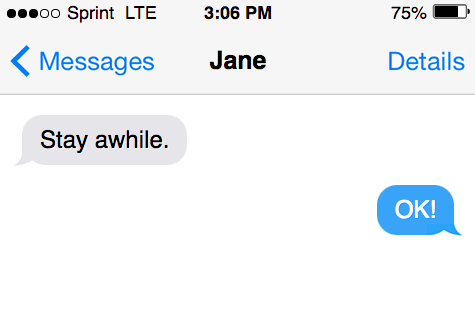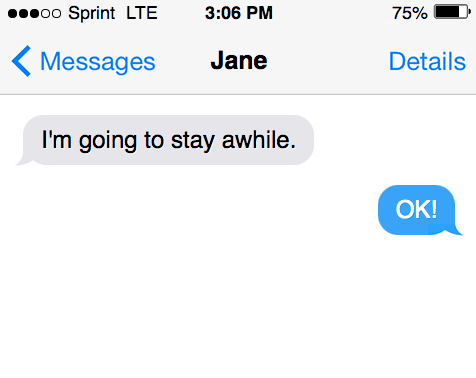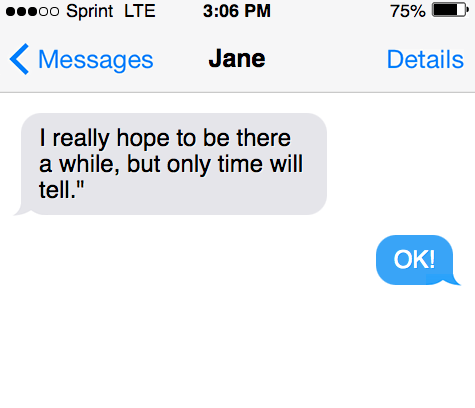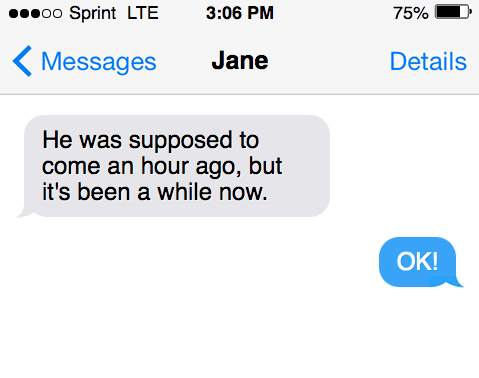Is it “awhile” or “a while?” Writing can be challenging, especially when words like “a while” and “awhile” pop up. Understanding the (subtle) differences between these two words is critical to becoming a better writer.
Here’s how you can understand what differs “a while” and “awhile,” so you can become a better writer.
Awhile: one word
When “awhile” is written as one word, it is an adverb meaning “for a period of time.”
Other adverbs usually end in “ly,” like “slowly,” “badly,” or “warmly.”
Put simply, “awhile” is like putting “for” and “a while” together.
In this clause, “Max waited patiently for his sign to go,” the word “patiently” is the adverb.
But, you can easily replace “patiently” and change it so “awhile” is an adverb.
For example: “Max waited awhile for his sign to go.”

A while: two-word expression
“A while” is a noun phrase made up of two words.
The phrase contains the article “a” and the noun “while.”
The noun phrase “a while” means “an unspecified amount of time.”
There is a difference when sentences only use the term “while” and those that use “a while.”
For example, “while” has several synonyms, including “time,” “stretch,” and “stint,” among others.
The difference between “awhile” vs. “a while”
The primary difference between awhile vs. a while is the part of speech the terms represent.
Both provide a specific measure of time, but one has two separate words while the other term is a single word.
Also, you can use “a while” and “awhile interchangeably in writing (in certain circumstances).
When it comes to correctly using both these words, there is a simple way to know how and when to do so.
For example, “a while” often follows a prepositional phrase, like “for” or “in.”
As an example clause, “Karl said he would be home in a while.”

In the previous clause, “in” is the preposition.
In comparison, the adverb meaning for “awhile” cannot follow or replace a preposition.
For instance, in the sentence, “Karl said he would be home in a while,” rewriting the sentence as “Karl said he would be home awhile” drastically changes its meaning.
To use “awhile” correctly, consider replacing the term with “temporarily in the sentence.
If the sentence still makes sense, you have used “awhile” correctly in your writing.
For example, “He’s going to rest awhile” and “He’s going to rest temporarily” still carry similar meanings.
Part of speech “a while” belongs to
“While” is a noun meaning “a period of time.”
The two-word form “a while” should be used when following a preposition.
Or, the phrase should be used alongside the words “ago” or “back.”
One example of how to use “a while” in a sentence is as follows:
- “I will wait awhile for the next bus.”

Part of speech “awhile” belongs to
“Awhile” is an adverb.
Adverbs are words or phrases that modify an adjective, verb, or word group.
Adverbs limit or restrict the meaning of verbs or other parts of speech.
Typically, adverbs express a relation of place, time, circumstance, cause, degree, etc.
One example of an adverb in a sentence is:
- “The roads are very steep.”

Why are these commonly confused words
These words are easily mixed up because of their similar definitions.
To most people, it seems like “awhile” is the one-word version and “a while” is the two-word version.
However, the terms represent different parts of the American English language, even though they have similar definitions.
The two-word version uses proper grammar to describe a more specific period of time.
For instance, “He took a break in Brazil for a while doing freelance work.”
The previous sentence implies the subject spent multiple months or years in Brazil.
To indicate a short time, you may write something like, “I waited a while for our ride to come, but it never did.”
In this case, you can imply the subject waited about an hour or so (a much shorter period).

When to use a while: noun phrase
Noun phrases like “a while” can be tricky to understand when to use in your writing.
Remember, this noun phrase is used to describe a certain period of time, whether that be a long or short period.
Here’s an easy way to know whether or not you’re using the noun phrase correctly; if you can easily swap out the noun phrase for “a moment,” then your writing is correct.
“It’s been a while since we got together” and “It’s been a moment since we got together” have the same meaning, you’ll notice.
So, if you want to portray a long or short time doing something, “a while” is the article to use.
When to use awhile: adverb
The adverb “awhile” is a little tricky to understand at first.
The one-word form acts adverbially, meaning it provides modifications to a verb.
If you were to use the adverb “awhile” in a comment like this, “You should go play quietly awhile,” the term offers a modification to the verb “play.”
Here’s an easy way to check if you’re using awhile in a sentence properly: if you can swap out the term for “temporarily,” then you’re using the adverb “awhile” correctly.
Can “a while” and “awhile” be used interchangeably?
No, a while and “awhile” cannot be used interchangeably because they have different grammatical rules.
However, phrases like “a while back” and “a while ago” are synonymous and can be used interchangeably.
Examples of “a while” in a sentence
The two words, “a while,” represent a more specific period of time.
The noun phrase doesn’t necessarily carry different meanings. It helps make your writing clearer.
“It’s been a while since I last saw you and your family.”
“I really hope to be there a while, but only time will tell.”
“I’m pretty sure she spent a while in the hospital before going back to school.”
“He was supposed to come an hour ago, but it’s been a while now.”
Examples of “awhile” in a sentence
Here are some examples of sentences that contain “awhile.”
“We should hold off awhile longer to go on vacation.”
“Why don’t you play awhile while I get your things ready?”
“This party is fun. Let’s stay awhile.”
“You should go outside for awhile to clear your head.”
“We settled on game night rules awhile ago.”
“He should stay awhile. There will be cake arriving soon.”
“He said he sent me an email, but I haven’t checked my inbox in awhile.”
Synonyms for “while”
You also simply use “while” in some instances to indicate a period of time.
“He wanted a little while longer with her company” is one correct way to use the term.
To help you understand the difference, here are some synonyms for “while.”
- Stint.
- Interval.
- Period.
- Spell.
How to remember which phrase to use
Here’s a simple trick to help your AP Style Guide writing: do you need a word like “for” or “in” in front of “awhile” or “a while”?
If so, use “a while” and, if not, use “awhile.”
Here’s the difference in some common phrases:
- “He plans to stay awhile.”
- “He plans to stay for a while.”
Sources
- What is an adverb? – Merriam-Webster
- Awhile vs. a while: Differences – Masterclass
- A While vs. Awhile – The Grammar Chicken
- What’s The Difference Between “A While” And “Awhile” – Dictionary.com
- ‘Awhile’ vs. ‘A While’ – Merriam-Webster
- Awhile vs. A While – Grammarly
- The Eight Parts of Speech – TIP Sheets – Butte College
Inside this article
Fact checked:
Content is rigorously reviewed by a team of qualified and experienced fact checkers. Fact checkers review articles for factual accuracy, relevance, and timeliness. Learn more.
Core lessons
Glossary
- Abstract Noun
- Accusative Case
- Anecdote
- Antonym
- Active Sentence
- Adverb
- Adjective
- Allegory
- Alliteration
- Adjective Clause
- Adjective Phrase
- Ampersand
- Anastrophe
- Adverbial Clause
- Appositive Phrase
- Clause
- Compound Adjective
- Complex Sentence
- Compound Words
- Compound Predicate
- Common Noun
- Comparative Adjective
- Comparative and Superlative
- Compound Noun
- Compound Subject
- Compound Sentence
- Copular Verb
- Collective Noun
- Colloquialism
- Conciseness
- Consonance
- Conditional
- Concrete Noun
- Conjunction
- Conjugation
- Conditional Sentence
- Comma Splice
- Correlative Conjunction
- Coordinating Conjunction
- Coordinate Adjective
- Cumulative Adjective
- Dative Case
- Determiner
- Declarative Sentence
- Declarative Statement
- Direct Object Pronoun
- Direct Object
- Diction
- Diphthong
- Dangling Modifier
- Demonstrative Pronoun
- Demonstrative Adjective
- Direct Characterization
- Definite Article
- Doublespeak
- False Dilemma Fallacy
- Future Perfect Progressive
- Future Simple
- Future Perfect Continuous
- Future Perfect
- First Conditional
- Irregular Adjective
- Irregular Verb
- Imperative Sentence
- Indefinite Article
- Intransitive Verb
- Introductory Phrase
- Indefinite Pronoun
- Indirect Characterization
- Interrogative Sentence
- Intensive Pronoun
- Inanimate Object
- Indefinite Tense
- Infinitive Phrase
- Interjection
- Intensifier
- Infinitive
- Indicative Mood
- Participle
- Parallelism
- Prepositional Phrase
- Past Simple Tense
- Past Continuous Tense
- Past Perfect Tense
- Past Progressive Tense
- Present Simple Tense
- Present Perfect Tense
- Personal Pronoun
- Personification
- Persuasive Writing
- Parallel Structure
- Phrasal Verb
- Predicate Adjective
- Predicate Nominative
- Phonetic Language
- Plural Noun
- Punctuation
- Punctuation Marks
- Preposition
- Preposition of Place
- Parts of Speech
- Possessive Adjective
- Possessive Determiner
- Possessive Case
- Possessive Noun
- Proper Adjective
- Proper Noun
- Present Participle
- Prefix
- Predicate



